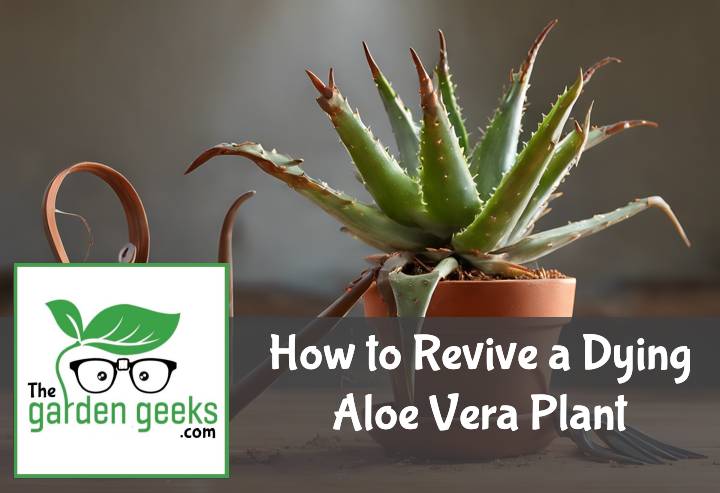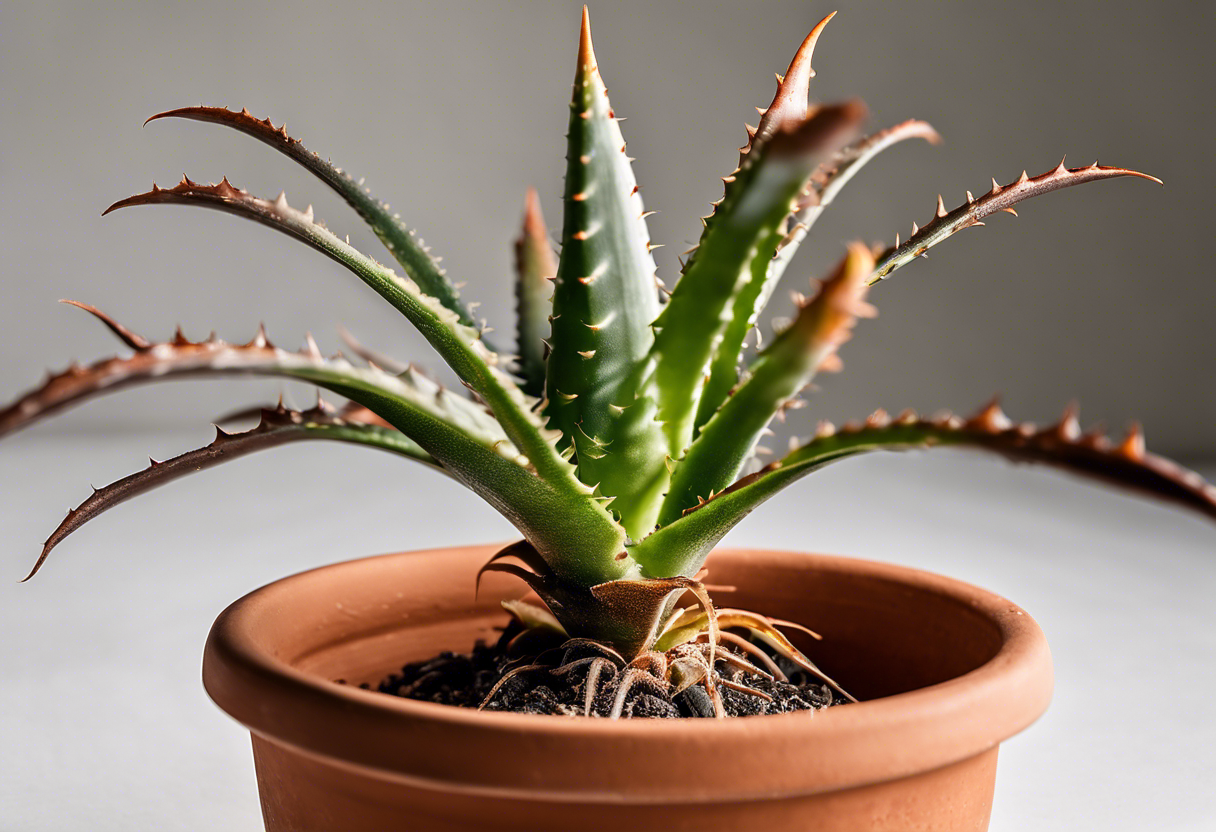Ever looked at your once-thriving Aloe Vera plant only to find it wilted, brown, and on the brink of extinction? I’ve been there, trust me. It’s like watching a favorite character in a TV show meet their untimely end. But don’t lose hope just yet! This guide on How to Revive a Dying Aloe Vera Plant could be your plant’s plot twist.
In this blog post, we’ll explore the common causes of an ailing Aloe Vera and practical steps to nurse it back to health. So strap in and prepare for some botanical CPR – let’s bring that green buddy back from the brink! Keep reading about How to Revive a Dying Aloe Vera Plant.
Key Takeaways
- Identify signs of a dying Aloe Vera plant, such as browning leaves and root rot.
- Overwatering is a common cause; ensure the plant has well-draining soil and a pot with drainage holes.
- Move the plant to a location with indirect sunlight, as direct sun can burn it.
- If the plant has root rot, remove it from its pot, cut away rotten roots, let it dry out, then repot in fresh soil.
- Regularly check for pests and diseases.
Understanding Aloe Vera Plant Health
When it comes to Aloe Vera Plant Health, it’s crucial to know what a healthy specimen looks like. Recognizing the signs of a thriving plant helps you spot when things go south. Now, let’s dive into how to identify deterioration in your green buddy.
Identifying Signs of a Dying Aloe Vera Plant
Ever wondered, “How to Revive a Dying Aloe Vera Plant“? Well, first things first. You gotta know the symptoms of a dying one. If your plant is turning brown or yellow, or its leaves are drooping or thinning, that’s not good news.
But don’t panic just yet! These are just indicators of an unhealthy Aloe Vera and not necessarily a death sentence. It might be crying out for help. So, keep an eye out for these signs and get ready to play plant doctor!
Common Causes of Aloe Vera Plant Deterioration
Alrighty then! Let’s talk about the reasons for this sad state of affairs. The typical causes for an unhealthy Aloe often boil down to overwatering or insufficient light.
These factors affect your Aloe Health more than you’d think! Too much water can lead to root rot while too little light can cause your plant to become leggy and weak.
Understanding these causes is key in preventing further deterioration and getting your Aloe back on track. Remember folks, knowledge is power when it comes to plant health!
Assessing Your Aloe Vera Plant’s Condition
Before you can figure out how to revive a dying Aloe Vera plant, you gotta take a good, hard look at your green buddy. It’s all about assessing the plant’s condition, folks. We’re talking soil, pot conditions, and any unwelcome visitors (aka pests or diseases). This is the first step in getting your Aloe back on track.
Evaluating the Soil and Pot Conditions
Now let’s get down and dirty with some soil talk. The right soil type for your Aloe Vera is crucial. You want something that drains well – think sandy or gritty mix. If your plant’s sitting in waterlogged soil, it’s gonna be unhappy.
Next up, we’ve got pot size. Size does matter here! Too small and your Aloe might feel cramped; too big and it could drown in excess water. Aim for a Goldilocks situation – just right!
And speaking of water, let’s not forget drainage. Those little holes at the bottom of the pot? They’re not just for show! They help excess water escape so your plant doesn’t end up with soggy roots.
Finally, if you suspect your plant needs a new home (aka repotting), don’t panic! It’s easier than you think to give an Aloe Vera a fresh start.
Checking for Pests or Diseases
Alrighty then, onto pests and diseases. These sneaky little buggers can wreak havoc on your poor Aloe Vera without you even noticing until it’s too late.
Common culprits include aphids (those tiny green bugs) and root rot (a nasty fungal disease). To spot these issues early on, make sure to check under leaves and near the base of the plant regularly.
If you do find any unwanted guests or signs of disease, don’t despair! There are plenty of ways to treat these problems and get your Aloe back to its healthy, vibrant self. Remember, treating Aloe Vera diseases is all part of the journey in indoor plant care.
So there you have it! Assessing your plant’s condition is a vital first step in figuring out how to revive a dying Aloe Vera plant. Keep an eye on that soil, pot, and for any pesky pests or diseases. Your Aloe will thank you for it!
Reviving Techniques for a Dying Aloe Vera Plant
When it comes to how to revive a dying Aloe Vera plant, there are a few key techniques you can use. These include adjusting watering practices, modifying light exposure, and changing soil and repotting. Each of these methods plays a crucial role in Aloe Vera plant care and can help in reviving dying plants.
Adjusting Watering Practices
Watering is critical when it comes to keeping your Aloe Vera happy. Overwatering or underwatering can cause serious harm. If you’re seeing signs of water stress in plants, like droopy leaves or brown spots, it’s time to reassess your watering routine.
The goal is to maintain optimal moisture levels. So, how do you achieve this? Well, the trick is not to let the soil get too dry or too wet. This balance is what we call optimal watering for Aloe Vera.
Modifying Light Exposure
Light exposure is another important aspect of indoor plant revival techniques. Too much or too little light can affect your Aloe Vera’s health negatively. If your plant looks pale or has thin leaves, it might be suffering from low light exposure.
On the flip side, if your plant’s leaves are turning brown and crispy, it might be getting too much sunlight. The ideal light for Aloe Vera is bright but indirect sunlight. Remember that every plant has its own sunlight requirements – find that sweet spot!
Changing Soil and Repotting
Lastly, let’s talk about changing soil and repotting. Sometimes, despite all efforts, the problem lies beneath the surface – literally! If you notice that your Aloe isn’t growing as it should or if its roots look cramped up against the pot walls, then it’s probably time for repotting.
Choosing the best soil for Aloe Vera is also essential during this process. A well-draining soil mix can do wonders for your plant’s health. So, don’t shy away from getting your hands dirty and giving your plant a fresh new home!
Preventive Measures to Keep Your Aloe Vera Healthy
When it comes to maintaining Aloe Vera health, prevention is better than cure. So, let’s talk about some healthy Aloe Vera practices and Aloe Vera maintenance tips that can save you from googling ‘How to Revive a Dying Aloe Vera Plant‘.
Ideal Care Routine for an Aloe Vera Plant
First things first, the ideal Aloe Vera care routine. It’s like a spa day for your plant!
Watering? Check. But remember, less is more when it comes to watering Aloe Vera. These babies prefer dry feet over soggy roots any day.
Next up, sunlight. Your aloe needs its daily dose of Vitamin D but not too much! So, find a spot where it gets indirect sunlight.
And finally, soil type. The best soil for your green friend is well-draining soil. Think cactus mix or sandy loam – something that doesn’t hold water for too long.
Tips to Prevent Common Problems
Now onto some handy tips to prevent those pesky problems that can turn your lush green aloe into a wilting mess.
Overwatering? It’s the number one killer of these plants. To avoid this common problem with Aloes, make sure you’re watering only when the top inch of soil is dry.
Pest infestations? They’re like uninvited guests at a party. To keep them away from your precious plant, regularly check for signs of pests and treat immediately if spotted.
Remember folks, prevention is key when it comes to keeping Aloes healthy and avoiding the dreaded search on ‘How to Revive a Dying Aloe Vera Plant‘.
To Wrap Up
In a nutshell, reviving your wilting aloe vera is like rebooting an old computer – it’s all about patience, care, and knowing the right buttons to push. So don’t toss out your green buddy just yet!
For more detailed steps on How to Revive a Dying Aloe Vera Plant, follow the link. Remember, every plant deserves a second chance!





